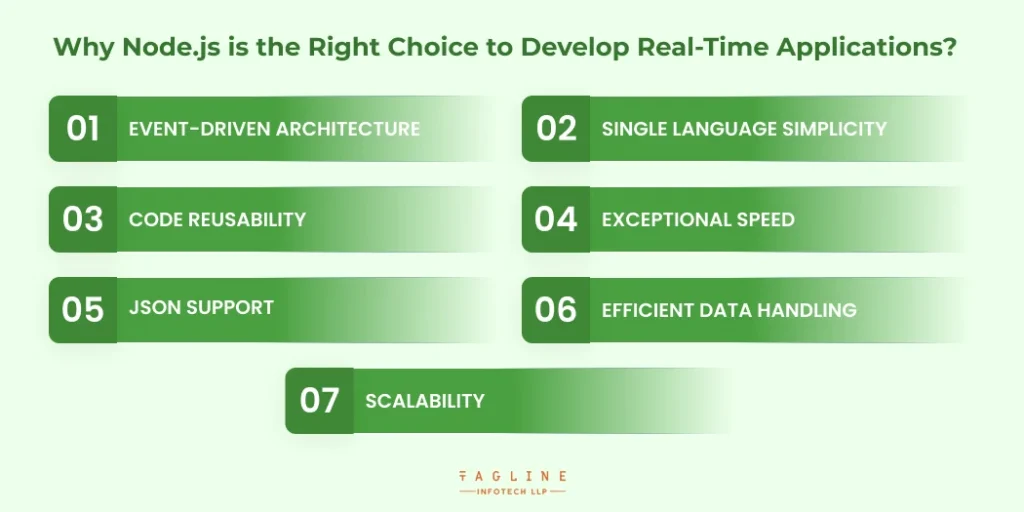Finance & IT Email Marketing: A Data-Driven Approach
February 2, 2026
Home >> Node.JS >> How to Build Real-Time Applications Using NodeJS

Node.js is a powerful tool to Build Real-Time Applications Using NodeJS, known for allowing JavaScript to run outside a web browser. Built on Chrome’s V8 engine, it ranks as the top web framework for building real time Node js applications. Node.js uses a single-threaded event loop, which helps it efficiently manage many client requests at once, making it a go-to choice for server-side development. One of Node.js’s strengths is its flexibility. With a wide range of libraries, packages, and third-party APIs, you can easily extend its functionality to build customizable applications. Many popular companies rely on Node.js for their applications, including:
It’s a versatile platform that can power anything from small projects to large-scale applications.
Think about when you’re chatting with friends online, making a video call, or playing an online game. In all these situations, something happens instantly—you get immediate responses or actions. This is what we call a real-time application.
Real-time apps can be either web-based or mobile. They process and respond to data instantly, so the experience feels immediate. Examples of real-time apps include instant messaging, online gaming, and video conferencing. Popular platforms like Facebook, Twitter, and Gmail are all real-time web applications. These apps help people connect and collaborate instantly, no matter where they are.
The purpose of a real-time app is to deliver information and enable interactions instantly, without any waiting time. This ensures users receive up-to-the-minute updates, enhancing their experience with fast, accurate communication. By eliminating delays, these apps improve efficiency and help boost productivity.
Node.js excels by handling numerous simultaneous connections with just one thread. This innovative design translates into several significant advantages: it manages multiple requests smoothly without heavy threading, reduces resource consumption by using fewer threads, and supports high concurrency through its event loop. Additionally, while Node.js supports multi-threading and parallel processing, its emphasis on a single-threaded approach ensures better scalability and efficiency under typical web loads. In essence, Node.js’s streamlined method of managing concurrent connections makes it an ideal choice for developing fast and scalable real-time applications.
Node.js is built on an architecture that’s known for its flexibility and scalability, making it a great fit for real-time applications. Its design can handle heavy workloads and is highly resilient, so developers often choose Node.js to create dynamic, real-time apps.
The real strength of Node.js lies in its asynchronous, event-driven model. This allows it to manage multiple requests simultaneously without blocking others, unlike other technologies like ASP.NET, JSP, or Spring, which use a multithreaded approach. Here are some key features of Node.js architecture:
These features make Node.js particularly well-suited for real-time, high-performance applications.

Building a successful real-time application hinges on a few key factors: speed, scalability, and user experience. Node.js stands out by equipping developers with powerful tools and features that not only enhance these metrics but also ensure your application connects deeply with its users. Whether you’re developing for the web or mobile, here’s why Node.js is the go-to technology for crafting real-time applications that truly engage.
In a real-time application, managing multiple users simultaneously is crucial. Node.js excels in this area with its event-driven architecture and asynchronous capabilities, allowing it to handle numerous requests smoothly. This approach not only streamlines the process but also simplifies synchronization and data transfer, enhancing the application’s performance.
Typically, building an application involves juggling different technologies for the front end and back end. But with Node.js, which runs on JavaScript, you can use the same language across both sides. This consistency makes data flow between the client and server more efficient, ensures better synchronization, and simplifies the development process by allowing developers to focus on one language throughout the project.
In real-time web and mobile app development, the ability to reuse code is invaluable for speeding up the process. Node.js is a developer favorite because it supports the creation of reusable modules, such as React components, which can be easily integrated into various projects. With tools like Bit and NPM, managing and sharing packages across projects becomes straightforward, particularly when transitioning to Node.js from other environments.
Node.js is renowned for its speed in developing high-performance real-time apps, and this reputation is backed by solid evidence. Built on the Chrome V8 engine, which rapidly compiles JavaScript into machine code, Node.js has seen performance improvements with each engine update. Additionally, Node.js Performance Optimization is enhanced by its non-blocking I/O feature, allowing it to handle numerous concurrent requests efficiently, making Node.js an excellent choice for fast, responsive applications.
JSON makes data exchange between servers and clients seamless, especially in real-time applications. Unlike server technologies like Ruby on Rails or PHP which convert JSON into binary models, Node.js keeps it in its original JavaScript form. This direct handling simplifies data exchange and boosts efficiency in real-time apps.
Node.js is great at managing data efficiently. It processes user input instantly and can run logic on the fly, ensuring quick responses without delays between the server and client. This means your application can handle new information and deliver fast results in real-time.
Node.js excels in scalability. It makes scaling applications straightforward, whether you’re adding more servers (horizontal scaling) or upgrading existing ones (vertical scaling). This flexibility helps you build applications that grow smoothly with your needs.
Node.js allows developers to use the same code for both the server and the client, streamlining data exchange and ensuring everything stays in sync. This unified approach reduces the need for multiple codebases, making development faster and more efficient.
Speed is essential for web frameworks, and Node.js excels in this area. It handles data quickly, ensuring that real-time apps respond to user actions without delay, even when dealing with large data volumes.
One of the strengths of Node.js is its ability to reuse code across different parts of an application. This not only speeds up development but also makes it easier to transition from other platforms to Node.js, as existing code can be easily adapted.
Node.js is excellent at managing data, allowing users to add and interact with information in real-time, even from mobile devices. This responsiveness ensures quick reactions from the app, reducing the delay between user actions and outcomes.
Node.js uses JavaScript for both front-end and back-end development, which is a big reason for its widespread use. This single-language approach simplifies coding, boosts productivity, and helps create secure, scalable applications. With everything in one language, developers can quickly update and deploy solutions without the hassle of juggling multiple languages.
Node.js is great at handling proxy servers in real-time applications, ensuring smooth communication between clients and servers. It efficiently distributes workloads and maintains security, making it perfect for apps that need fast data updates, like financial dashboards or live sports scores.
Node.js is a top choice for real-time applications because of its event-driven architecture, which allows it to handle multiple requests at once by continuously listening for and responding to events. This setup is especially useful for tasks that need quick communication, like live streaming or online gaming, where Node.js efficiently manages numerous connections at the same time. By responding swiftly to frequent events like user interactions and messages, Node.js ensures faster responses and better overall performance.
Real-time single-page applications (SPAs) often face SEO challenges due to their dynamic content. Node.js addresses this with server-side rendering (SSR) frameworks like Next.js, which allow the server to generate the initial HTML before client-side rendering takes over. This approach improves SEO by ensuring search engines can index fully-rendered HTML, enhancing visibility and rankings—crucial for platforms such as news sites and community forums.
Node.js benefits from a dynamic and engaged community that fuels innovation and provides essential support for developing real-time applications. The community’s active contributions help continuously adapt Node.js to meet the specific demands of real-time apps. With tools like Node Package Manager (NPM), developers can tap into collaborative efforts, boosting creativity, speeding up development, and contributing to the long-term success of real-time applications.
Node.js streamlines the development process with its single-language environment and a vast library of reusable modules, significantly reducing the workload for developers. This efficiency is particularly valuable for fast-paced real-time applications, where quick development cycles and frequent updates are necessary. If you want to leverage this efficiency for your projects, you can Hire Node.js Developers to build robust, real-time applications swiftly and effectively.
Node.js offers a variety of Nodejs realtime frameworks and libraries that are essential for creating high-quality real-time applications. Below are some of the most popular ones:
Express.js is a widely-used web application framework for Node.js, known for its simplicity and flexibility. It’s a go-to choice for developing single-page, multi-page, and hybrid web applications, especially those that require real-time functionality. Express.js streamlines the development process with its robust routing and middleware capabilities and is often used to create RESTful APIs.
Sails.js is another powerful web framework tailored for real-time app development, operating on the model-view-controller (MVC) architecture within the Node.js environment. It’s designed for building custom, enterprise-grade applications and is also commonly used for developing APIs.
Socket.io is a popular event-driven library that excels in real-time application development. It facilitates bidirectional communication between the client and server, making it ideal for applications requiring real-time interaction. Socket.io consists of both client and server components, ensuring seamless integration on both ends.
Nest.js is a progressive and versatile framework for Node.js, perfect for creating complex real-time applications. It supports TypeScript, which allows developers to build scalable and reliable applications with clean and maintainable code. Nest.js provides a range of powerful tools and features to enhance the development of robust real-time applications.
We’ve covered a lot about using Node.js for real-time applications, and it’s clear why it’s such a popular choice. Its strong capabilities and efficiency make it an excellent option for handling real-time tasks. But remember, creating a real-time application isn’t just about the technology—it’s also about having the right team with the skills to bring your vision to life. If you’re looking for expert support, a Node.js Development Company like Tagline Infotech offers tailored services to meet your needs. With years of experience across various industries, Tagline Infotech can help you craft innovative real-time applications, combining deep technical knowledge with a commitment to your project’s success.
Yes, Node.js is effective for real-time applications due to its event-driven architecture and capability to handle numerous simultaneous connections.
To deploy a Node.js application, you can use cloud platforms such as AWS or Heroku. Alternatively, set up a traditional server and deploy your app using deployment tools like Git or FTP.
Install Node.js, navigate to your project directory in the command line, and start the application using Node.js.

Digital Valley, 423, Apple Square, beside Lajamni Chowk, Mota Varachha, Surat, Gujarat 394101
D-401, titanium city center, 100 feet anand nagar road, Ahmedabad-380015
+91 9913 808 2851133 Sampley Ln Leander, Texas, 78641
52 Godalming Avenue, wallington, London - SM6 8NW